With Passover approaching, I spoke with chef Dini Klein for tips on how to prepare for this year’s three-day Yom Tov. Dini is the founder of Prep + Rally, a family-focused meal prep system, as well as a busy mom of three. Above all, she definitely is a woman who understands that every minute counts! Read my interview with Dini below for tips on how to maximize your time in the kitchen when preparing for Passover.
Please note that this interview has been lightly edited for length and clarity.
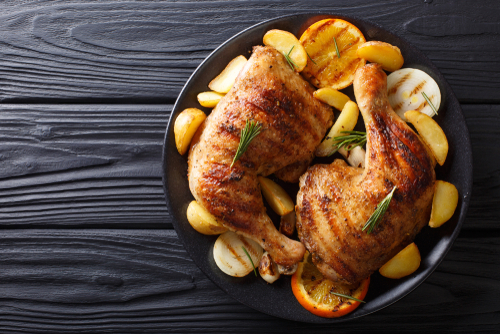
DG: Please walk us through your planning, preparing and cooking process for a three-day holiday from start to finish.
DK: When it comes to holidays in general, I like to keep things very simple. Some people take out their mixers and make fancy cakes and do all these wild things. I am very much a minimalist when it comes to the holidays – and even for Shabbat, I am super, super simple.
I do what’s called a “roasting special.” I’ll roast a chicken, I’ll grill a meat, I’ll make a few different roasted vegetable side dishes and a batch of simple rice or quinoa and that’s it.
Then, the day of, I’ll just make a great pesto to go with everything, or maybe a chimichurri sauce to go over the meat and a great salad dressing to make a roasted vegetable salad with. I try to take away all of the stress from the planning because it’s just not worth it.
When it comes to planning three-day holidays, I write up all the days and meals that will require a menu, and then I start filling in with the proteins. I see where I can repurpose things and separate them by a day or two (maybe I’ll do meatballs for both of the dinners, for example).
Any time I can batch-cook, I try to, so this way I can get things out of the way. I also like to marinate proteins in advance and stick them in the freezer; this way I can cook things very easily and quickly.
After the proteins, I think about the soups. I usually make one or two soups for the holiday, and those can be made early on and frozen.
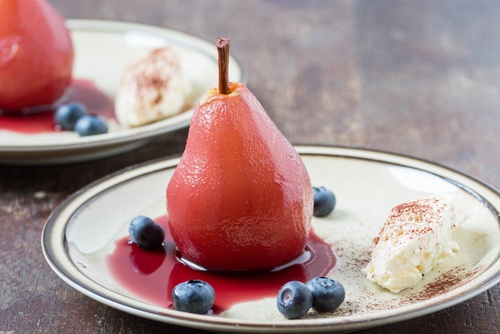
Then, I think about desserts. There’s usually a handful of desserts I want to make, and I’ll make them in bulk and freeze them. This way, we can have the same cookie throughout the whole holiday, but you don’t have to eat the same thing every day in a row. I’ll make a double batch of chocolate chip cookies let’s say, whatever it may be. Again, it’s super minimal. Maybe I’ll make a couple of baked goods, but I keep it very simple – no whipping egg whites; I don’t do any of that.
I’ll also make a couple of things fresh, like baked apples, poached pears, things like that, which are light, healthy, and can be made closer to the day, or on Yom Tov, possibly. Those are nice things to throw in last minute.
Then, when it gets closer to the holiday, I will fill in with the starches and vegetables. I like to do that fresh. I use big sheet pans so that I get a lot done all at once. I’ll make a handful of sauces the day of the holiday or the day before, which really elevate the meal.
Planning meals for holidays is all about writing things down, mind mapping and just putting your plan on paper and then on the fridge so you know what’s coming and there’s no confusion.
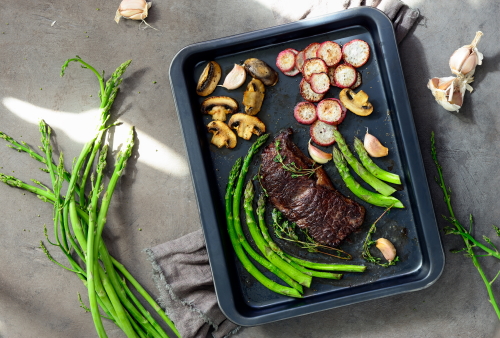
DG: What factors go into deciding what you should cook for a three-day holiday? How do you decide what to prepare for each meal?
DK: You have to consider whom you are having over, what your crowd likes, what’s going to go over well with everyone…
You want to make things that are simple that won’t stress you out, things that won’t break the bank, things that won’t take too long to prepare, and things that you’ll feel good about eating and serving, with a few special treats. Obviously, it’s a holiday, and you want it to feel special. Not everything has to be healthy, but for the most part, I like to serve things that are wholesome and satisfying and festive…
I’m not the kind of person who likes to try new recipes every holiday. I like to play around sometimes, but for the most part, I keep things really clean and simple on Passover. No one wants anything too heavy. It’s a lot of eating and a lot of food, so I just keep things simple for everyone’s sake.
DG: Many people feel overwhelmed when it comes to cooking for Passover, especially for a three-day holiday. Do you have any suggestions for how to prepare for the holiday in a way that is exciting and special to your family but won’t leave you feeling exhausted and/or overwhelmed?
DK: I think delegating as much as you can is helpful. If you have kids of eligible age to be helpful in the kitchen, have them peel potatoes or chop up the charoset for you. We have this old, dinky charoset chopper from my grandparents from forever ago that we still use every year, and it’s so fun for the kids to use. It’s like a salad chopper, but we call it the “charoset chopper,” and it’s always the kids’ job to chop the charoset. I think it’s such a big part of Passover to get the family and kids involved.
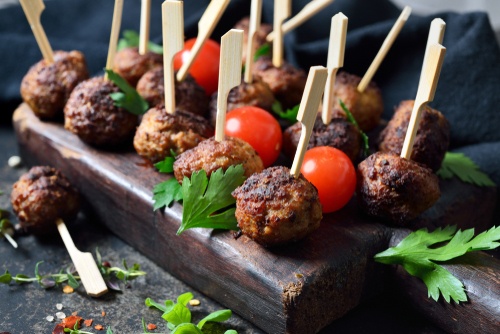
DG: Do you have any tips for making kosher-for-Passover food more exciting to kids?
DK: You can make meatballs and serve them on sticks, you can get some cookie cutters for the holiday and cut cookies into cute shapes, you can cut cheese into fun shapes for snacks, you can make little matzo pizzas… I think getting the kids involved can also be helpful. You can also pull one or two fun new recipes to try with the kids, like matzo brittle.
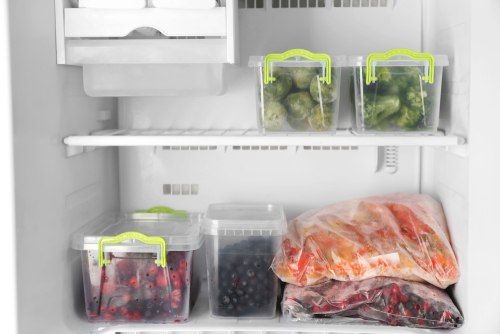
DG: Do you have any tips for reheating food and still having it taste fresh?
DK: Make sure you are storing things properly. If you’re freezing, definitely get out all the air from the bag or container as much as possible. If you’re wrapping things in tin foil, always do saran wrap first and then tin foil. The double protection helps get rid of any kind of freezer burn. Otherwise, ziptop bags are great to try to get out all the air.
When you’re reheating the food, let it defrost completely first, and then just go low and slow when you heat things up. 300 degrees Fahrenheit for 20 or 30 minutes is usually perfect.
When it comes to vegetables, the first time you make them, especially if you know you’re going to be reheating them, always undercook them a tiny bit, since vegetables cook a tiny bit more when you take them out of the oven. When you reheat vegetables, only put them in for around five minutes. No one needs a piping-hot asparagus – you’d rather have it crisp and green and alive than brown and wilted and gross. You don’t want to kill it.
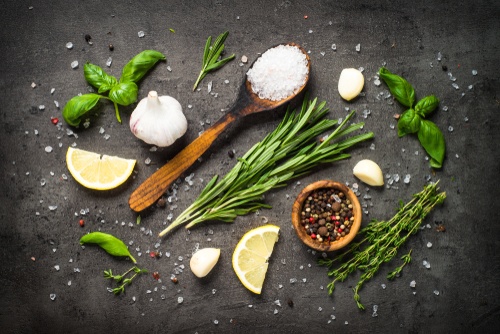
DG: Thank you so much for speaking with me today. Do you have any additional information or tips to share that will help make Passover prep easier for our readers?
DK: Just don’t stress out about it. Even if you are having a bunch of guests, no one needs crazy, intricate things. Keep things simple and wholesome. Make some really interesting, great sauces and dressings to spruce things up. Use lots of lemons, lots of herbs – especially if you’re freezing a bunch of items in advance and reheating, using fresh herbs and citrus is a great way to wake up flavors.
To see more of Dini’s work and learn more about the Prep + Rally meal-prep system, check out Dini’s Instagram page, @prepandrally. Head over to prepandrally.com to try Prep + Rally for one month free!





